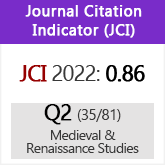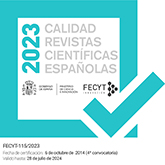Tradición clásica, politica y humanismo en la Castilla del Cuatrocientos. Las Glosas de Alonso de Cartagena a "De Providentia"
DOI:
https://doi.org/10.3989/aem.1994.v24.1007Abstract
The formation of the Modern State changed the values of the chivalrous class: the ethos of what incorporated a letrado dimension. Clergymen and letrados made access to the ancient texts easier for the laymen, guiding them in a moral direction. Alonso de Cartagena's translation of Seneca's De providentia is a significant evidence of this fact. His interpretation of Seneca's work shows the dependence of eloquence on moral values. The glosses confine the reading within a very strict orthodoxy. We can distinguish three types: 1) Those that give us information about historical and mythological characters. Their sources (Plato, Orosius, Valerius Maximus, Cícero, Ovidius, the Bible, the Romulion) show an extensive classical culture. Historical accuracy js less important than exemplary morality. A cautious suspicion of mythology is shown. 2) Those that discuss doctrinal facts: suicide and free will. This is a categorical declaration of orthodoxy which does not conceal certain tensions. 3) Those which refer to the problems of translation: they justify the given version. Sometimes the current period is mentioned.In this way, the gloss acquires a didactic value, and, by being addressed to the king, a political value also.
Downloads
Download data is not yet available.
Downloads
Published
1994-12-30
How to Cite
Fernández Gallardo, L. (1994). Tradición clásica, politica y humanismo en la Castilla del Cuatrocientos. Las Glosas de Alonso de Cartagena a "De Providentia". Anuario De Estudios Medievales, 24(1), 967–1002. https://doi.org/10.3989/aem.1994.v24.1007
Issue
Section
Miscelaneous Studies
License
Copyright (c) 2020 Consejo Superior de Investigaciones Científicas (CSIC)

This work is licensed under a Creative Commons Attribution 4.0 International License.
© CSIC. Manuscripts published in both the printed and online versions of this Journal are the property of Consejo Superior de Investigaciones Científicas, and quoting this source is a requirement for any partial or full reproduction.All contents of this electronic edition, except where otherwise noted, are distributed under a “Creative Commons Attribution 4.0 International” (CC BY 4.0) License. You may read here the basic information and the legal text of the license. The indication of the CC BY 4.0 License must be expressly stated in this way when necessary.
Self-archiving in repositories, personal webpages or similar, of any version other than the published by the Editor, is not allowed.














